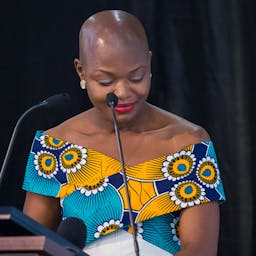My Recommendations to the Lagos State Government on Inclusivity of Persons with Disabiliies (PWDs) in Healthcare Policy
Jan 21, 2015
Story
The efforts made by the Lagos State government in promoting the inclusivity of persons with disabilities (PWDs) in policy making is commendable. However there is so much more to be done. The State cannot adequately tackle PWDs access to healthcare if it does not tackle other equally mitigating barriers, for example:
• Education and Re-orientation- lack of education is a major reason why PWDs may not access healthcare services even when these provisions are made available for free. Most persons who have a disability prefer to visit herbal homes and faith healing centers instead of seeking professional help. There is also the problem of a lack of uniformity as to the definition of disability – with the implication that people living with disability are in denial of their condition.
• Poverty and Unemployment - PWDs may not be able to access healthcare services if they are un-employed and unable to pay their fares and medical bills for services at their nearest specialist facility.
• Accessibility: The transport network and the road designs as they are currently do not support disable access. Therefore PWD are unable to access healthcare facilities because they are unable to get to the facilities in the first place. The roads are bad and even where they are good; they are not PWD friendly.
• Lack of Specialist Centers: There is a dearth of specialist centers to handle the care and health needs of PWD especially girls and women who have been sexually abused. Many women with disabilities are victims of sexual and other forms of abuse but because there are no specialist centers to handle these cases, with particular reference to their sexual, emotional, psychological, mental health and well-being are not able to get help.
It is commendable that Nigeria is a signatory to the UN Convention on the Right of PWD. Nigeria singed this declaration on 30.3.2007 and ratified it on 24.9.2010
It is my recommendation that:
• The State and Federal Government enshrine the principles and provisions of the UN convention of the rights of PWD in Law. This will be the ultimate commitment to upholding and defending the rights of PWD in Nigeria. By legislating in favour of the rights of PWD, the Government at all levels and private sector will be compelled to demonstrate its respect for the rights and dignity of PWDs by making services available and accessible to PWD from the primary through the tertiary level. It would also be helpful to provide a time frame for achieving this goal;
• The Government should continue to create public awareness about the needs of PWD and be seen to set the standard for respecting the wishes and needs of PWDs at all times by bringing PWDs, Organizations dedicated to the rehabilitation, protection and advocacy of this marginalized group to the table when drafting and implementing laws, when constructing and renovating public facilities into becoming accessible (to avoid problems of ramps that are too high as is visible in Lagos University Teaching Hospital and some other public offices) and when developing reading, writing and other aids for PWDs;
• In promulgating legislation to uphold the rights of PWD, the Government should make special provision for the protection, empowerment, prioritization and education of girls and women with disabilities in the State and country. As it has been agreed by the UN, its member countries and organizations that this group face double discrimination and are more at risk of gender-based violence.
• Lastly, the government in drafting legislation should extend the definition of disability to include temporary disability and make provisions for all persons who are unable to adequately perform their duties like pregnant women, senior citizens, persons with mental illness, persons with prolonged illness and persons with non-physical disabilities in decision and policy making.




